The conversation I wished we'd had
We talked about everything–except what she wanted me to do when she could no longer make life and death choices for herself.
A few days ago, Victoria Chin of Carer Mentor posed this question: If you could return to the start, what learning/tip would you share with yourself? I didn’t answer, but the question has stayed rattling around in my brain.
I felt like Mom and I had had all the legal and financial conversations before she got bad. We moved money into an irrevocable trust–in case she’d need Medicaid. Durable Power of Attorney, Health Care proxy, updated Will, updated Living Will, DNR, Life Estate for her condo. I was either a beneficiary or a co-signer everywhere. And we’d been having the right to die conversation since I was a kid. As a family, we believed everyone has the right to choose their own time and method. My father, an overweight, sedentary smoker, had wanted to live forever, even with cancer, emphysema, spinal stenosis, sciatica, and seizures. Mom had been amassing a bag pills for years–her Get Out of Life card, her Go Bag.
Most of those pills turned out to be useless, the rest were either too old or there weren’t enough to make a difference. She suggested she could kill herself by running into traffic. At the time, she could barely walk with the walker. There would be no “running.” We talked about moving to a state that allowed physician-assisted suicide, but dementia isn’t considered a terminal illness here, and other than losing her mind, she’s healthy. The half dozen countries that allow euthanasia all specify that the patient must be in full command of their faculties, and we’d already had her ruled incompetent for legal and financial reasons. Even if we hadn’t done that, that’s the basic nature of dementia, isn’t it, slowly stealing one’s cognition and competency?
Switzerland could’ve worked if she could do it herself. Which she couldn’t, so it didn’t.
We read Final Exit together, a sort of holy grail on how to kill yourself. Seconals are the best choice. In the 70s, Seconals seemed to be everywhere and cheap enough on the street. Since they’ve become the go-to method for doctors when they do assist euthanasia, the lethal dose that was $50 is now $3000, and impossible to get on the street. Her best option seemed to be helium; the book emphasized that the helium method was untraceable, painless and panic-less. But, it would require putting her head inside a large plastic turkey roasting bag. Just reading about it triggered a claustrophobic panic, but she was determined. We did a dry run with just the bag, no helium, and she wasn’t as freaked out as she had expected.
We agreed it sounded like a kind of sweet way to go. I’d be there to hold her hand and she’d be in charge of her life until the end. The question was, when?
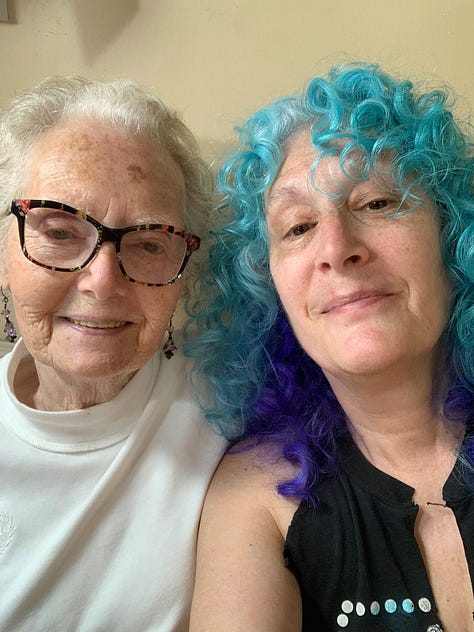
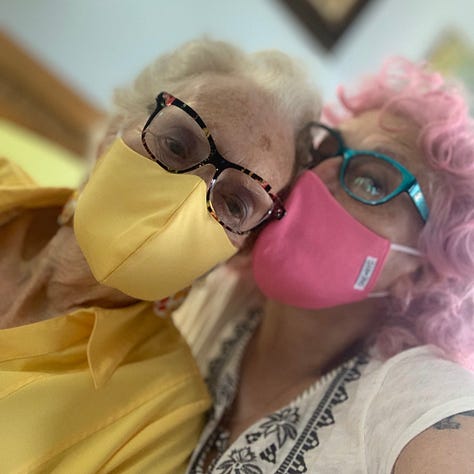
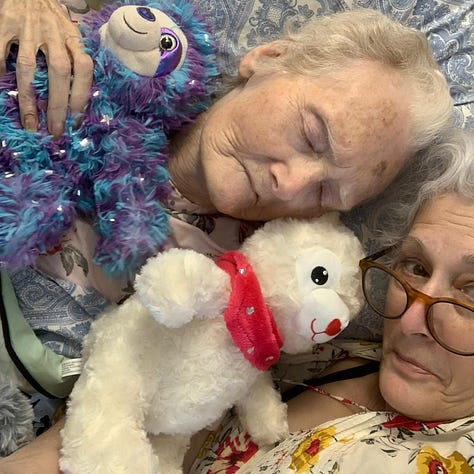
A counselor from Caring Kind had told me that “most of them do it,” meaning most people with dementia plan on taking themselves out before it gets bad. “But,” she’d said, “by the time it’s an appropriate response, it’s too late. They can’t.”
Mom put it off and off. During the sad and crying years–the depression from still being here when everyone else was gone, from not being able to do the things she used to do easily like remember words or know how to change the channel on the television–we talked about it a lot. She said she was worried that I’d go to jail, and she probably was, but she hadn’t asked for the pills, just to give them a try.
Prescriptions for Lexapro, Seroquel, and later Lorazepam helped with the depression. Hallucinations came–they were and still are pleasant. Invisible friends took the place of those flesh and blood friends who’ve moved away or passed away. Weirdly, her language skills are intact with the invisible crew. Coherent. Linear. Clear. With us, the word salad takes a larger and larger part of our conversations.

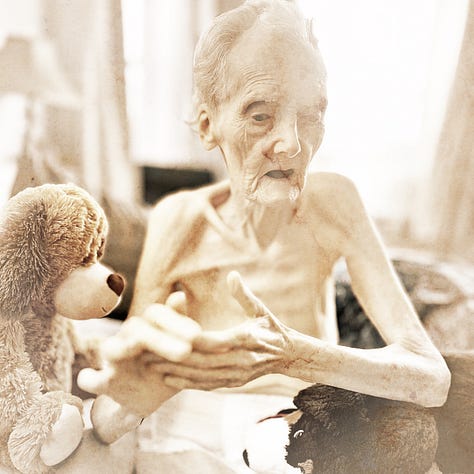
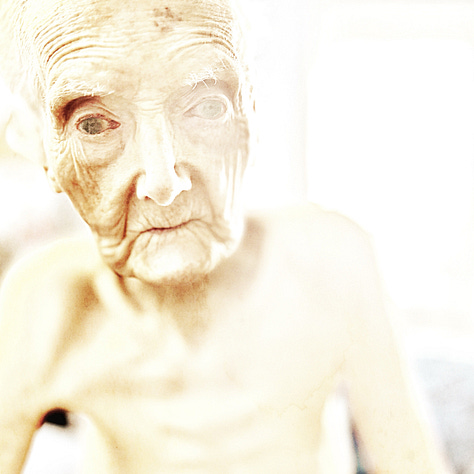
We’d never talked about this part, no one imagined she’d live this long, get this far. We never discussed what to do when we got here. If we had, if we’d talked about how she wanted to be managed, handled, live when she no longer recognized me or anyone else, when the best part of her days were spent in a hallucinatory world, when she couldn’t eat solid food anymore and was having difficulty swallowing even liquids, when she couldn’t walk on her own, needed adult pull-ups & someone to wipe her ass and shower her, when her thoughts and stream of consciousness resembled a snow globe more than anything else, we didn’t talk about what to do then. Now.
What if we did?
She didn’t want this. No one does, not even my father would have wanted this life.
She’s not miserable, though. Her invisible friends are constant companions and she has a child-like sense of humor and play, enjoys touch and company, stuffed animals and music, especially something with a good bass line or beat like Shaggy and Bob Marley.
But she’s not who she was and it’ll only get worse.
What if she had said, When I get that bad, take me out? Could I? Could I live with myself afterwards if I did? Would her prior consent ease my guilt once she’d ceased to be the person who’d consented?
I’ve had to check my motivations when looking for the right time to say goodbye to an old and ailing cat. Looking at the intersection of compassion and convenience, how much of my decision stemmed from my own convenience in letting go of all the caregiving: insulin, hydration, tube-feeding, having liquid drained from the lungs and so on. How much of the decisions is self-less: finding the right moment, letting them go on a high note before they’re miserable and in pain? And, how much is self-ish–just making my life easier?
Now, it we’d be talking about my mother, not a cat. Try finding the intersection of that Venn Diagram (insert decades of therapy here). These circumstances aren’t covered in a living will; perhaps they should be. Pretty sure this is part of the guilt stage of the Kübler-Ross continum. There is no guilt stage, you’d think there would be. There should be. There is always a guilt phase.
Would I help my mother die now, if we’d talked about it? Could I? I don’t know and I never will, we didn’t have that conversation when we could’ve. I’d like to think I could and would respect her wishes, but I’ve never imagined it would be easy to live with if I did.






Thanks for the restacks, Sami. This is a thing we can’t, and shouldn’t, do alone. 🩵